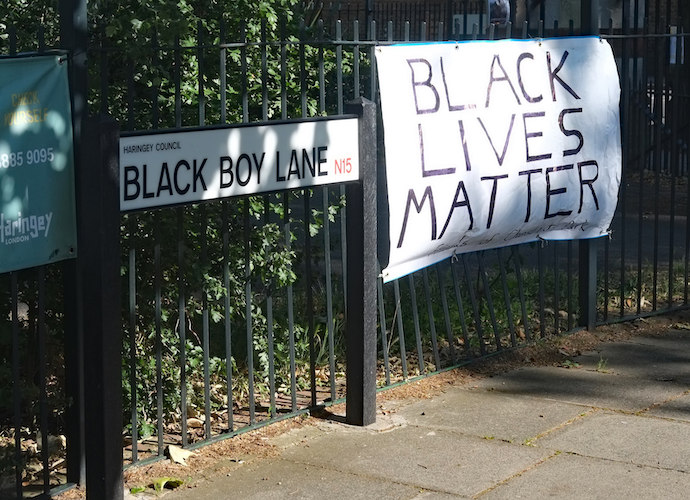It’s a typical north London street of late Victorian two-storey terraced homes put up as the railway arrived with a small park and a primary school at one end and prices now heading towards £600,000 for a three-bed house, according to some estimates. Typical except for its name – Black Boy Lane.
Despite periodic concerns about its origins and present day connotations, the name wasn’t officially challenged until June last year in the wake of the George Floyd murder, the emergence of the Black Lives Matter movement and the toppling of the Colston statue in Bristol when then Haringey Council leader Joseph Ejiofor pledged to change it.
Inevitably the pledge was controversial, seen by some as an unnecessary or “token” gesture and by others as an important recognition of the contemporary values of the borough and the offence the name was said to be causing. A discussion of the proposal on popular local forum Harringay Online attracted the most comments since the site was established in 2007.
Either way, addressing the issue hasn’t been straightforward. Residents of the street are now being asked for a third time what they think after 72 per cent of those who responded said no to a change earlier this year.
What’s in a name? Haringey’s local history museum concluded that Black Boy Lane had been named after a pub of that name that used to be on the street’s corner, sited where a “Black Boy” alehouse had been first mentioned in manorial records in 1690.
The Black Boy pub name has generally been held to derive from the nickname given to the dark-complexioned Charles II (1630-1685), though references to child chimney sweeps and slave trade or colonial connotations have also been suggested.
The origins of the pub’s name remained unclear, the local historians said, though its sign had featured a caricature black child in a grass skirt until replaced after a local campaign in the 1980s and by the time of its closure a decade ago it had been renamed the Black Grape.
Whatever the history “meanings change” said Ejiofor: “The term ‘Black Boy’ is now used most commonly as a derogatory name for African heritage men.” It was time for it to go.
Residents weren’t so sure. In an initial, informal, consultation, some said it was now innocuous rather than offensive and there were more pressing priorities for the council. More were concerned about the inconvenience a change would create or weren’t keen on the new names the council was suggesting.
The legal power to change a London street name is the London Building Acts (Amendment) Act dating from 1939. This specifies a requirement to notify residents in the street by means of a notice “posted in some conspicuous position” or by “circular delivered at every building” and to consider any objections.
The issue wasn’t just about those living in the street though, councillors argued. Children used it going to and from school, buses travelled the street announcing the “Black Boy Lane” stop every day. Equalities Act considerations and community cohesion were in play.
A statutory consultation was therefore promoted borough-wide on a formal proposal to rename the street after John La Rose, activist and founder in 1966 of Haringey’s New Beacon bookshop. This was the preferred option above Dame Jocelyn Barrow, educationalist, equalities campaigner and the first black female BBC governor.
It was this consultation that returned the seven to one “no” vote from the street. Although for some the name was now a source of “deep offence and distress”, for others it was not felt to be derogatory and did “not have a significant impact on their day-to-day life” officers reported.
By contrast, the borough-wide part of the consultation produced a “yes” majority for change. The council decided it needed to go back to residents again. “I would support the name change, but we have to reflect on the opposition from residents of the road itself,” said one councillor close to the situation.
That latest consultation is now underway, with the council also planning a wider “community-led” public realm strategy as well. “We need to really understand where these names come from, who we are celebrating and what memorials we have,” deputy leader Mike Hakata said last month.
There is one measure of agreement: if the road was being named today, it wouldn’t be called Black Boy Lane. But the debate in Haringey, as elsewhere in London, shows that street names, their histories and their changing meanings, are complex to deal with. Will the third consultation produce a resolution? It’s open until 19 January.
Photograph by Julian Osley.
On London is a small but influential website which strives to provide more of the kind of journalism the capital city needs. Become a supporter for £5 a month or £50 a year and receive an action-packed weekly newsletter and free entry to online events. Details here.


Is it offensive ? Ask the local black residents to vote on it and follow their decision .
I am surprised the article makes no mention of the associated costs of changing the name: the cost of consultations, changing signage on the street, buses, maps etc. And apparently all the resident and business address changes cost lots (post office related – utility bills etc.
I wonder what the longest address with the most addresses is? Hopefully Edgware Road doesn’t need a name change – that would cost millions!
This name change seems to be a piece of virtue signalling imposed on reluctant local people by middle class white people and a council seeking to distract from its overall incompetence. Spend the money in things that are really needed.